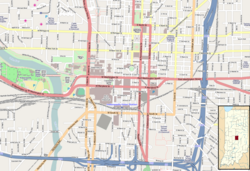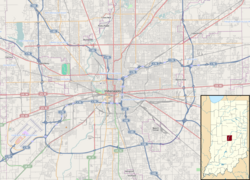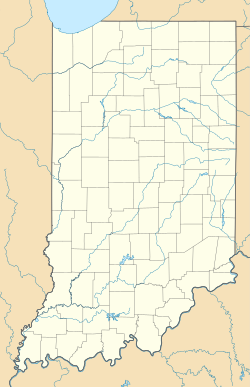H. P. Wasson and Company, aka Wasson's, was an Indianapolis, Indiana, based department store chain founded by Hiram P. Wasson. Its flagship store, the H. P. Wasson & Company Building, was built in 1937 and is listed on the U.S. National Register of Historic Places.[2]
| Company type | Department store |
|---|---|
| Industry | Retail |
| Founded | 1874 |
| Founder | Hiram P. Wasson |
| Defunct | 1980 |
| Fate | Closure due to business decline as a result of change of ownership |
| Headquarters | Indianapolis, Indiana |
Number of locations | 7 (at its height in 1967) |
Area served | Central Indiana |
| Products | men's, women's and children's clothing, footwear, jewelry, beauty products, bedding, housewares and home furnishings. |
H. P. Wasson & Company Building | |
 | |
| Location | 2 W. Washington and 2 N. Meridian Sts., Indianapolis, Indiana |
| Coordinates | 39°46′2″N 86°9′30″W / 39.76722°N 86.15833°W |
| Area | less than one acre |
| Built | 1937 |
| Architect | Rubush & Hunter; Graham, Anderson, Probst, & White |
| Architectural style | Art Deco |
| NRHP reference No. | 97001539[1] |
| Added to NRHP | December 24, 1997 |
History
editH. P. Wasson bought the Bee Hive Drygoods Store in 1874, renaming it nine years later as H. P. Wasson and Company. With the death of H. P. Wasson in 1910, and his son Kenard Wasson in 1912, the store was sold to Gustave A. Efroymson and his brother-in-law Louis P. Wolf. The chain would eventually consist of seven stores with the flagship store located at 2 West Washington Street in downtown Indianapolis.
Efroymson was president of the company from 1912 to 1930.[3][4]
In 1930, a second store was built on Monument Circle on the site of the former Morton Hotel.[5] The entire second and parts of the third floors of the Monument Circle Annex store were destroyed in a fire on the evening of June 1, 1969.[6]
After the Korean War, Wasson's began to build new stores in the outdoor shopping centers that were being developed in new housing developments on the outskirts of suburban Marion County during the late 1950s and early 1960s. By the early 1960s, first shopping centers and then enclosed malls were being built inside and also in nearby communities outside of Marion County. Branch stores were built in a shopping center in Kokomo and enclosed malls in Anderson and Bloomington. The open air shopping center locations at Eastgate and Kokomo were later converted into enclosed malls.
Louis C. Wolf became president in 1963 upon the retirement of his father Walter E. Wolf, who remained CEO. He was killed in a plane crash in Alaska during a hunting trip while piloting a new single-engine Cessna in August 1967 at the age of 40. Members of his family sold the company in October of the same year to Goldblatt's of Chicago.[7] Expansion and new development of the firm died upon Louis C.'s death.
In September 1967, Richard L. Glasser was appointed president and CEO while Walter E. Wolf, Sr. remained chairman of the board of directors.[8]
There were a total of seven stores by the time Wasson's was acquired by Goldblatt's in 1967, which included three stores in Indianapolis-area shopping centers and in malls located in the cities of Kokomo, Anderson, and Bloomington.[7][9][10][11] The Goldblatt's acquisition of Wasson's was not successful as the two chains did not cater to the same market segments. Wasson's catered to the middle class, while Goldblatt's was a discount department store. During Goldblatt's ownership a distinct decline in merchandise quality occurred. Moreover, Goldblatt's did not open any new outlets after the acquisition, or relocate any stores into the new regional malls that ringed the city.
After suffering large losses, Goldblatt's sold the downtown store and the other property around Monument Circle to Melvin Simon and Associates for $2.25 million (~$7.62 million in 2023) in December 1979,[12] and started to close the Indianapolis metropolitan stores.
In September 1980, Goldblatt's announced that they planned to close the Anderson and Bloomington stores along with other Goldblatt stores in January 1981 as a cost saving measure after experiencing staggering corporate losses for the third straight year.[13]
The Bloomington store at College Mall closed in January of the following year.[14] The store had opened in 1965 as one of the original anchors of the mall.
On February 27, 1981, Goldbatt's announced that the last Wasson's store would close in Kokomo on the next day.[15] The Kokomo store had been one of the first stores in the Kokomo Mall when that mall had opened in 1963, and was the first store that H. P. Wasson had opened outside of Marion County.
Building
editThe nine-story Art Moderne flagship store located at 2 West Washington Street was converted into a retail/office complex in the early 1980s. The main store was designed by the noted Indianapolis architectural firm of Rubush and Hunter and constructed by the William P. Jungclaus Company in 1937. A distinguishing feature of the Washington Street Store was the elimination of windows on the upper floors. With the advent of fluorescent lighting, windows were no longer required. The Washington Street location was added to the National Register of Historic Places in 1997. The former Wasson's annex located on Monument Circle burnt down in 1969 and was subsequently replaced by a park.[citation needed] In 1998, a new headquarters for Emmis Corporation was built on the site.[16]
Wasson's Credit Union, which opened in October 1923, was the first credit union in Indiana and in the Midwest.[citation needed]
Competitors were L. S. Ayres, L. Strauss & Co., and William H. Block.
See also
editReferences
edit- ^ "National Register Information System". National Register of Historic Places. National Park Service. March 13, 2009.
- ^ "Weekly List Of Actions Taken On Properties: 12/22/97 Through 12/26/97". National Register of Historic Places. January 2, 1998.
- ^ "Marion County Jewish History" (PDF). Indiana Department of Natural Resources.
- ^ Marksohn, Deborah B. (1994). "H.P. Wasson and Company". In Bodenhamer, David J.; Barrows, Robert G. (eds.). The Encyclopedia of Indianapolis. Indiana University Press. p. 652. ISBN 9780253112491 – via Google Books.
- ^ "New Wasson Store". Tipton Tribune. February 2, 1927. p. 4 – via NewspaperArchive.
- ^ "Wasson Store Hit By Fire". Logansport Pharos Tribune and Press. June 2, 1969. p. 2 – via NewspaperArchive.
- ^ a b "Goldblatt's Buys 8 Stores of H. P. Wasson in Indiana". Chicago Tribune. October 31, 1967. p. C7. ProQuest 169962868.
- ^ "H. P. Wasson & Company Has New President". Kokomo Tribune. September 8, 1967. p. 8 – via NewspaperArchive.
- ^ "H. P. Wasson & Company Stores Are Sold to Goldblatt Chain". Kokomo Tribune. October 30, 1967. p. 12 – via NewspaperArchive.
- ^ "Wasson Store Sold To Goldblatt Firm". Anderson Herald Bulletin. October 30, 1967. p. 1 – via NewspaperArchive.
- ^ "Goldblatt of Chicago buys H. P. Wasson". Kokomo Morning Times. October 31, 1967. p. 3 – via NewspaperArchive.
- ^ "Goldblatt's sells Indianapolis store". Chicago Tribune. December 30, 1979. p. W4. ProQuest 170053539.
- ^ Winski, Joseph (September 7, 1980). "Goldblatt's putting its house in order". Chicago Tribune. p. N1. ProQuest 170496833.
- ^ "Mall addition has 22 new stores". Bloomington Herald-Telephone. April 23, 1981. pp. 44–45, 50.
- ^ "Chain store closes Kokomo outlet". Kokomo Tribune. February 27, 1981. p. 7 – via NewspaperArchive.
- ^ King, Mason (May 8, 2019). "Indianapolis Monthly to vacate longtime offices, make way for STAR Bank on Circle". Indianapolis Business Journal. Retrieved December 10, 2020.
Further reading
edit- Geib, George W. (1981). Indianapolis: Hoosier's Circle City. Arcadia. pp. 86, 87. ISBN 9780738524627. OCLC 57250968.
- Whitaker, Jan (2006-08-22). Service And Style: How the American Department Store Fashioned the Middle Class. St. Martin's Press. p. 104. ISBN 9781429909914. OCLC 865093390 – via Google Books.



